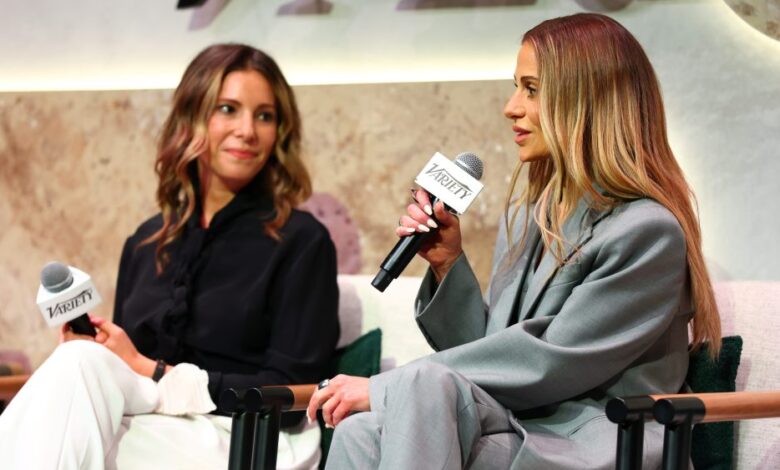Major Takeaways from Variety’s Entertainment Marketing Summit

The Variety’s Entertainment Marketing Summit, presented by Deloitte, was a gathering of top marketing executives from various industries including film, television, video gaming, and fashion. Held at Neuehouse in Hollywood, the event provided a platform for participants to share insights into their marketing strategies and operations.
Throughout the day-long summit, several recurring themes emerged. One of the key discussions revolved around the importance of engaging existing fandoms, reaching out to younger Gen Z consumers, and exploring the evolving relationships between creators and brands.
One of the major takeaways from the panels was from the “The Right Stuff – Impact Marketing Roundtable.” Darren Abbott, chief brand officer for Hallmark, emphasized the need to move away from traditional demographic approaches in marketing. He advocated for a shift towards understanding the psychographic profile of the audience and creating authentic connections.
In the panel on “Breaking Through to the New American Consumer,” Gayle Troberman, executive marketing advisor at iHeartMedia, highlighted the pitfalls of overly targeted marketing strategies. She stressed the importance of reaching out to a broader audience to drive sales and relevance.
The discussion on “The Business of Bravo: How Brands Tap into the Bravoverse” featured Allison Levin, president of advertising and partnerships at NBCUniversal, and reality star Dorit Kemsley. They discussed the success of BravoCon and how brands can engage with fans through such events, creating lasting partnerships and memorable experiences.
The panel on “From Players to Creators: How Gamers Are Shaping the Creator Economy” focused on the impact of video game creators in the marketing sphere. Executives from Havas Play discussed the buying power and career control that gaming creators possess, emphasizing the importance of authentic partnerships.
Lastly, the panel on “Gen Z Levels Up – Today’s Power Consumer Group” brought together marketing leaders from various companies to discuss the influence of Gen Z consumers. The panelists shared insights on how brands can effectively engage with this demographic group and stay relevant in a rapidly changing market.
Overall, the Variety’s Entertainment Marketing Summit provided a platform for industry leaders to exchange valuable insights and strategies, highlighting the importance of adapting to evolving consumer trends and forging authentic connections with audiences. Blizzard Entertainment’s chief marketing officer, Monica Austin, emphasized the importance of understanding and engaging with Gen Z in order to shape brands and strategies. Austin highlighted the need to incorporate Gen Z voices into the company, stating, “We have to bring them in the room. They are going to shape our brands. They’re going to shape our strategies.” She emphasized the value of working directly with Gen Z individuals to identify effective ways to reach their generation and beyond.
On the topic of embracing AI for marketing success, Jenn Lockhart, senior vice president of sales at Teads, emphasized the importance of top leadership embracing AI technologies. Lockhart stressed the need to demystify AI and integrate it into daily workflow. By adopting AI tools and strategies, leaders can set an example for their teams and drive efficiency and strategy alignment.
Sara Pollack, Pinterest’s global head of consumer marketing, discussed the power of world-building and entertainment franchises in engaging audiences. She shared a successful example of Pinterest partnering with K-Pop group ENHYPEN at Coachella to create a denim-themed Pinterest board. This collaboration led to audience members at Coachella wearing denim in response to the board, highlighting the impact of engaging with fandoms.
Jo Fox, senior vice president of marketing at ESPN, highlighted the importance of engaging younger audiences through cultural connections, such as music partnerships with artists like Travis Scott. Fox emphasized the intersection of sports, entertainment, and culture in engaging audiences and staying relevant in a rapidly evolving media landscape.
Joe Whitmore, executive vice president of global marketing at Sony Pictures Entertainment, discussed the strategy behind rolling out franchise installments and engaging both existing and new fans. Whitmore shared insights on the upcoming film “28 Years Later” and the careful balance of appealing to existing fans while introducing the franchise to new audiences. By leveraging strategic marketing tactics, such as trailers, magazine features, and social media engagement, Whitmore emphasized the importance of maintaining fan interest while attracting new fans.
In conclusion, understanding and engaging with diverse audiences, embracing new technologies like AI, and leveraging the power of entertainment franchises are key components of successful marketing strategies in today’s dynamic landscape. By incorporating these insights and strategies into their approach, companies can effectively reach and resonate with their target audiences.





